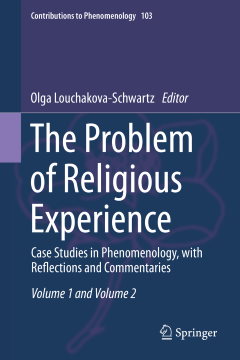Repository | Book | Chapter

(2019) The problem of religious experience, Dordrecht, Springer.
Religious experience and transcendence (or the absence of such)
commentary on part 2
Olga Louchakova-Schwartz
pp. 187-197
This commentary to Part 2 of Volume 1 of The Problem of Religious Experience: Case Studies in Phenomenology focuses on the double role of transcendence in religious experience, as transcendence of individual ego at the core of religious experience and as a mode in which the other is given to the self. This opens, on one hand, the possibility of examining how imposed relevances, satisfaction, freedom, and necessity, and other features of consciousness associated with alterity, play out in relation to religious experience; on the other hand, it raises the question of whether religious experience can be not only associated with the mystery of alterity but understood as an internalized, idealized version of relationship with the other, and with specific ethical demands that account for possibility or impossibility in the constitution of such experience. Religious experience is described in light of the metaphysics of companionship, which means adopting an ethical disposition of making oneself attractive to the other, who is God, so that religious experience can take place in the form of interpersonal intimacy. Perhaps as a result of Rudolph Otto's critique of Friedrich Schleiermacher's position in the beginning of the former's "The Idea of the Holy," phenomenological investigations of religious experience focused on mystery, leaving out of analysis the feeling of absolute dependence. But considering an event of religious experience as an unveiling of intersubjective space brings Schleiermacher's view back into the spotlight.
Publication details
DOI: 10.1007/978-3-030-21575-0_11
Full citation:
Louchakova-Schwartz, O. (2019)., Religious experience and transcendence (or the absence of such): commentary on part 2, in O. Louchakova-Schwartz (ed.), The problem of religious experience, Dordrecht, Springer, pp. 187-197.
This document is unfortunately not available for download at the moment.



